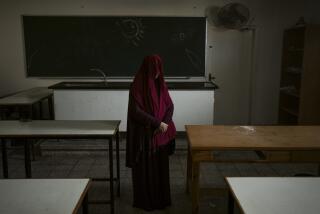Mothers Take Children to Jail With Them in Pakistan : Asia: Women awaiting trial often have no alternative. If left outside, the youngsters could be used as child laborers. One 11-year-old boy has been locked up since birth.
- Share via
RAWALPINDI, Pakistan — Saima Ahmed, age 5, huddled beneath a smelly woolen blanket to protect herself from the winter chill and wondered if she will ever leave Adiala Jail.
“I go to sleep at night and I think, ‘What if I have to live here for the rest of my life?’ and I cry,” she said shyly.
Saima, like hundreds of children in Pakistan, has gone to jail with her mother, Nazreen, who is awaiting trial on theft charges and could receive a four-year term if convicted. In their stark, cramped cell devoid of furnishings, the children outnumber the women, 13 to 11.
Disgraced and destitute, jailed Pakistani women routinely take their young children with them because there is no alternative, said Hina Jilani of the independent Human Rights Commission of Pakistan.
The group estimates about 300 children are in jail with their mothers.
Orphanages are scarce, and if the children were simply left behind it is quite possible they would be used as child laborers, a common practice in Pakistani workshops.
“If they don’t go to jail with their mother, they could end up on the street begging or being sold,” Jilani said.
The children’s fathers are often in jail, too, or have abandoned their families. Jilani said many of the women are in jail on charges brought by their husbands, who either want to marry again or have left the country and do not want their wives free while they are gone.
The law says children should be removed from imprisoned mothers at age 7, but it says nothing about what should be done with them, and youngsters are seldom taken out. In the central city of Multan, there is an 11-year-old boy who has been in jail since birth, she said.
“The diet is not good. The children are totally isolated socially. Most have no idea of what’s going on outside the jail,” Jilani said.
There are no schools for the children and in many cases they do not receive proper medical care. Saima, who has been in jail for two months, had the sniffles and a cough, as did many of the others.
Imprisoned women in many countries keep their children with them. But the problems facing youngsters are particularly acute in an impoverished country like Pakistan.
“Imagine their life,” said Iftikar Hussein, a psychologist at Allama Iqbal Open University in Islamabad. “The guards are never very kind. The women--their mothers--are unhappy and crying all the time. It’s all very traumatic for children.”
Saima said that her only toy is a raggedy old doll and that she must fight to keep the other children from taking over her little corner of the jail compound, a sandy spot next to a 10-foot-high wall.
Kamran Rizvi, who heads a human rights committee set up by Prime Minister Benazir Bhutto’s government, says the government wants to stop jailing children.
“I am totally against keeping women in prison with their children,” Rizvi said. “But where can we keep them? There should be a separate institution for the children. Jails have a very negative psychological effect.”
Rizvi said the whole prison system needs to be overhauled. Prisons in Pakistan are overcrowded, poorly maintained and packed with people awaiting trial, he said.
Bhutto’s government is preparing a new law aimed at children younger than 12 who are in prison, including about 1,700 unaccompanied youngsters who face charges on their own ranging from loitering to murder.
The law will not prevent children from accompanying their mother to jail, but it will try to set a minimum standard of care, Rizvi said. Among his recommendations are special housing for children and their mothers near the women’s cells, compulsory schooling and a doctor on duty.
It remains to be seen if there will be any improvements. The government often talks about curing such problems but rarely comes up with the money. Even Rizvi concedes the government is short of resources.
“Our problem is pushing the government to spend money,” said Jilani. “Things are moving forward--slowly. That’s something.”
More to Read
Sign up for Essential California
The most important California stories and recommendations in your inbox every morning.
You may occasionally receive promotional content from the Los Angeles Times.










